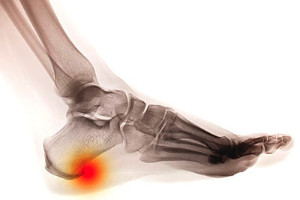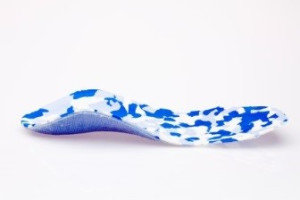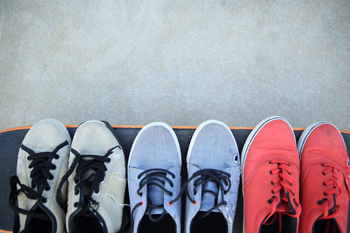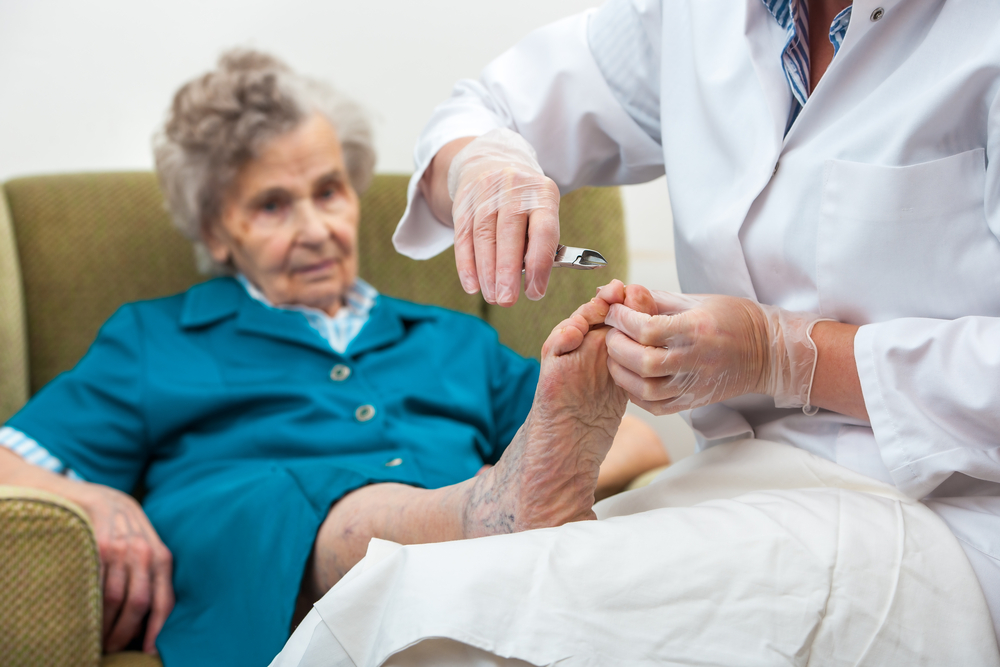
 When there is excessive stress in the heel, new bone is formed to protect the heel against fractures. This is known as a heel spur and often feels like a bump in the heel. It typically begins as cartilage and then progresses into solid bone. They’re present in about half the population, although not everyone has pain. The most common cause of heel spurs is plantar fasciitis. If pain is experienced, it’s usually in the morning or after resting. Typically, after the first few steps, the pain will improve as the foot gets used to the movements. Certain exercises may also help relieve the pain. Placing the affected foot on a tennis ball while rolling it around may be beneficial in relaxing the muscles. Additionally, bending the knees while moving up and down may provide additional relief.
When there is excessive stress in the heel, new bone is formed to protect the heel against fractures. This is known as a heel spur and often feels like a bump in the heel. It typically begins as cartilage and then progresses into solid bone. They’re present in about half the population, although not everyone has pain. The most common cause of heel spurs is plantar fasciitis. If pain is experienced, it’s usually in the morning or after resting. Typically, after the first few steps, the pain will improve as the foot gets used to the movements. Certain exercises may also help relieve the pain. Placing the affected foot on a tennis ball while rolling it around may be beneficial in relaxing the muscles. Additionally, bending the knees while moving up and down may provide additional relief.
Heel spurs can be incredibly painful and sometimes may make you unable to participate in physical activities. To get medical care for your heel spurs, contact Dr. Russell J. Ellicott from Augusta Foot Center. Dr. Ellicott will do everything possible to treat your condition.
Heels Spurs
Heel spurs are formed by calcium deposits on the back of the foot where the heel is. This can also be caused by small fragments of bone breaking off one section of the foot, attaching onto the back of the foot. Heel spurs can also be bone growth on the back of the foot. Bone may grow in the direction of the arch of the foot.
Older individuals usually suffer from heel spurs. Pain sometimes intensifies with age. Heel spurs are known to cause a substantial amount of pain. One of the main associations spurs are related to is plantar fasciitis.
Pain
The pain associated with spurs is often because of weight placed on the feet. When someone is walking, their entire weight is concentrated on the feet. Bone spurs then have the tendency to affect other bones and tissues around the foot. As the pain continues, the feet will become tender and sensitive over time.
Treatments
There are many ways to treat heel spurs. If one is suffering from heel spurs in conjunction with pain, there are several methods for healing. Medication, surgery, and herbal care are some options.
If you have any questions feel free to contact our office located in Augusta, GA. We offer the latest in diagnostic and treatment technology to meet your needs.
Read more about Heel Spurs Dr. Saeed Zahedi was recently named winner of the American Orthotic & Prosthetic Association’s Lifetime Achievement Award. Orthotics are shoe inserts that are designed to relieve heel pain, among other foot ailments. Plantar fasciitis, a common cause of heel pain, results when strain occurs in the ligament between the heel bone and the toes. Research has shown that orthotics may redistribute pressure from the heel to the arch and may also prevent the arch from dropping. This would have the effect of reducing tension in the plantar fascia. It is suggested that patients may want to consider other forms of treatment in conjunction with the orthotics, including taping the foot to relieve pressure or getting corticosteroid injections. It is advised to consult a podiatrist to obtain orthotics that are designed for your feet.
Dr. Saeed Zahedi was recently named winner of the American Orthotic & Prosthetic Association’s Lifetime Achievement Award. Orthotics are shoe inserts that are designed to relieve heel pain, among other foot ailments. Plantar fasciitis, a common cause of heel pain, results when strain occurs in the ligament between the heel bone and the toes. Research has shown that orthotics may redistribute pressure from the heel to the arch and may also prevent the arch from dropping. This would have the effect of reducing tension in the plantar fascia. It is suggested that patients may want to consider other forms of treatment in conjunction with the orthotics, including taping the foot to relieve pressure or getting corticosteroid injections. It is advised to consult a podiatrist to obtain orthotics that are designed for your feet.
If you are having discomfort in your feet and would like to try orthotics, contact Dr. Russell J. Ellicott from Augusta Foot Center. Dr. Ellicott can provide the care you need to keep you pain-free and on your feet.
What are Orthotics?
Orthotics are inserts you can place into your shoes to help with a variety of foot problems such as flat feet or foot pain. Orthotics provide relief and comfort for minor foot and heel pain, but can’t correct serious biomechanical problems in your feet.
Over-the-Counter Inserts
Orthotics come in a wide variety of over-the-counter inserts that are used to treat foot pain, heel pain, and minor problems. For example, arch supports can be inserted into your shoes to help correct overarched or flat feet, while gel insoles are often used because they provide comfort and relief from foot and heel pain by alleviating pressure.
Prescription Orthotics
If over-the-counter inserts don’t work for you or if you have a more severe foot concern, it is possible to have your podiatrist prescribe custom orthotics. These high quality inserts are designed to treat problems such as abnormal motion, plantar fasciitis, and severe forms of heel pain. They can even be used to help patients suffering from diabetes by treating foot ulcers and painful calluses and are usually molded to your feet individually, which allows them to provide full support and comfort.
If you are experiencing minor to severe foot or heel pain, it’s recommended to speak with your podiatrist about the possibilities of using orthotics. A podiatrist can determine which type of orthotic is right for you and allow you to take the first steps towards being pain-free.
If you have any questions please contact our office located in Augusta, GA. We offer the newest diagnostic and treatment technologies for all your foot and ankle needs.
Read more about Ankle Foot Orthotics for Athletes For many people, buying larger shoes over time is common, as they may gain a half shoe size over the age of 40. There are many bones, joints, and over 100 tendons in the foot. The ligaments may lose their elasticity, which may cause the feet to flatten, and the arches to lower. Additionally, the force of the body weight causes the “fat pads” to thin, which cushion the bottom of the feet. There’s a few important pointers to remember when buying shoes. The feet are largest at the end of the day, which makes it a good time to measure the foot. Typically, there should be a half-inch of space for the longest toe while standing. Also, it's beneficial if the shoes are made from soft material that conforms to the shape of the foot. They should fit comfortably and not slip as you walk. Lastly, walking in the shoes on carpeting is a good way to make sure they feel right.
For many people, buying larger shoes over time is common, as they may gain a half shoe size over the age of 40. There are many bones, joints, and over 100 tendons in the foot. The ligaments may lose their elasticity, which may cause the feet to flatten, and the arches to lower. Additionally, the force of the body weight causes the “fat pads” to thin, which cushion the bottom of the feet. There’s a few important pointers to remember when buying shoes. The feet are largest at the end of the day, which makes it a good time to measure the foot. Typically, there should be a half-inch of space for the longest toe while standing. Also, it's beneficial if the shoes are made from soft material that conforms to the shape of the foot. They should fit comfortably and not slip as you walk. Lastly, walking in the shoes on carpeting is a good way to make sure they feel right.
Getting the right shoe size is an important part of proper foot health. Seek the assistance of Dr. Russell J. Ellicott from Augusta Foot Center. Dr. Ellicott will provide the care you need to keep you pain-free and on your feet.
Getting the Right Shoe Size
There are many people who wear shoes that are the incorrect size, negatively affecting their feet and posture. Selecting the right shoes is not a difficult process, so long as you keep several things in mind when it comes to choosing the right pair.
As our feet hold our body weight and keep us moving, it is important to treat them right. Picking the right pair of shoes can provide your feet comfort and mobility without pain.
If you have any questions, please feel free to contact one of our office located in Augusta, GA. We offer the newest diagnostic and treatment technologies for all your foot care needs.
Read more about Getting the Right Shoe Size: To Keep Your Feet Happy Geriatric (elderly) people may be prone to foot problems, which may include ingrown toenails, corns, and calluses. A reason for this may be their inability to cut their own toenails due to poor eyesight or loss of mobility. A qualified caregiver should be able to cut toenails properly. Ideally, toenails should be kept short, as more problems tend to arise if the nails are too long. The shorter they are, the less risk there is of breaking a nail. As we age, it’s beneficial to stay healthy and active. However, it’s important to remember to practice proper foot care. A podiatrist should be consulted to learn the best options for correct maintenance and treatments.
Geriatric (elderly) people may be prone to foot problems, which may include ingrown toenails, corns, and calluses. A reason for this may be their inability to cut their own toenails due to poor eyesight or loss of mobility. A qualified caregiver should be able to cut toenails properly. Ideally, toenails should be kept short, as more problems tend to arise if the nails are too long. The shorter they are, the less risk there is of breaking a nail. As we age, it’s beneficial to stay healthy and active. However, it’s important to remember to practice proper foot care. A podiatrist should be consulted to learn the best options for correct maintenance and treatments.
If you need your feet checked, contact Dr. Russell J. Ellicott of Augusta Foot Center. Dr. Ellicott will attend to all of your foot and ankle needs and provide you with quality treatment.
Geriatrics and Podiatry
When people age, some common issues that may occur are bone density loss, dry skin, poor circulation, and rough brittle nails. These issues may also affect your foot health if the necessary steps are not taken to alleviate the problems.
It is important to take care of your feet because feet that are injured or diseased can affect your overall health. Having painful feet hinders your ability to do daily activities or may decrease your willingness to do the things that you need to do.
Visiting Your Geriatrician
As we age, health problems become more likely, so it is essential to visit your doctor for check-ups to ensure that you are doing the best you can to take care of your health. It is recommended to check your feet frequently for any possible cuts, bruises, swelling, corns or any other irregularities.
Taking Care of Elderly Feet
Cracked or dry feet can be treated by applying moisturizer often. It is also important not to wear old socks because the older the sock is, the higher the possibility there will be that there is bacteria there. Wear fresh socks and make sure they fit properly.
Proper foot health means that you can have a more active lifestyle and you will not be bogged down by pain. Foot health also leads to good circulation, which is paramount for overall health.
If you have any questions, please feel free to contact our office located in Augusta, GA. We offer the newest diagnostic tools and technology to treat your foot and ankle needs.
Read more about Geriatrics and Podiatry